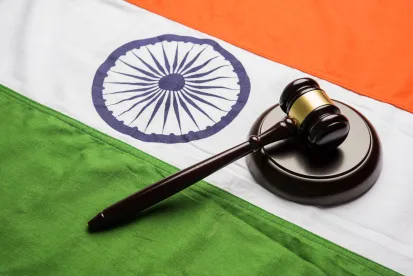In Techfab International Private Limited (“Techfab”) v. Midima Holdings Limited (“Midima”), the Delhi High Court granted an ad-interim anti-arbitration injunction on a prima-facie finding that the appointment of an arbitrator affiliated with a foreign institution violated the agreed arbitral procedure - which designated Delhi as the seat of the arbitration and Indian law as the governing law of the agreement. We analyse how this judgment may deviate from established principles governing grant of anti-arbitration injunctions, thereby resulting in pre-emptive judicial interference in arbitral proceedings.
Factual Background
Techfab, entered into an agency agreement with Midima (“Agreement”), which contained the following clause:
“9.1 In the event of any dispute or difference between the parties hereto on the subject matter or meaning or interpretation of any of terms either during the existence of this agreement of upon termination hereof, every effort shall be made by the parties to resolve the matter amicably. If the dispute has not been settled amicably within a period of 45 days of a party giving notice to the other of existence of the dispute, such dispute shall be finally settled through Arbitration in accordance with the UNCITRAL Arbitration rules. The parties agree that (i) the language to be used in the Arbitral proceedings shall be the English language and (ii) the number of Arbitrators & their appointing authority to be decided mutually (iii) the seat of arbitration shall be at India or any other UNCITRAL following countries to be decided mutually and the governing law will be of the country where arbitration will be conducted. The decision of the arbitration award shall be final and binding on each party.
…
9.3 Subject to the provisions of arbitration clause referred above, the court at New Delhi or the courts of capital of any UNCITRAL following county where arbitration is held, shall have exclusive jurisdiction.”
(emphasis supplied)
When certain disputes arose between the parties, Midima issued a notice of arbitration to Techfab where it: (i) stated that the Agreement will be governed by Indian law, and that the place of arbitration will be India; and (ii) proposed that arbitration proceedings be conducted in Delhi by a former judge of the Delhi High Court as the sole arbitrator. Subsequently, Midima made an application before the Permanent Court of Arbitration (“PCA”) for appointment of a sole arbitrator under the UNCITRAL Arbitration Rules. The PCA designated the Council of National and International Commercial Arbitration, Chennai (“CNICA”) as the appointing authority, which then appointed a sole arbitrator, affiliated with the Asian International Arbitration Centre (“AIAC”), Kuala Lumpur. Consequently, Techfab approached the Delhi High Court for a declaration that all orders passed or proceedings conducted by the sole arbitrator are null and void. Techfab also sought an anti-arbitration injunction restraining Midima from proceeding with the arbitration.
Judgment
The Delhi High Court granted an ex-parte ad-interim anti-arbitration injunction, by expressing a prima-facie view that the appointment of a sole arbitrator affiliated with a foreign arbitral institution is contrary to the agreed arbitral procedure. This was due to concerns that the sole arbitrator would conduct proceedings in Kuala Lumpur, rather than in India.
Analysis
The Delhi High Court’s rationale for deeming the appointment of an arbitrator affiliated with a Malaysian arbitral institution as a violation of the arbitration clause remains unclear. The court seems to make two assumptions, namely: (i) the arbitrator’s affiliation with a Malaysian arbitral institution necessarily entails that he will conduct proceedings in Malaysia; and (ii) merely conducting arbitral proceedings outside India (i.e. a foreign venue) violates any stipulation that India is the seat of arbitration.
Even if the arbitral procedure was not complied with, the court’s decision to grant an anti-arbitration injunction on this basis may deviate from the previous stance taken by Indian courts. In Kvaerner Cementation India Limited v. Bajranglal Agarwal, the Indian Supreme Court ruled that courts do not have the power to pass anti-arbitration injunctions since an arbitral tribunal has the power to decide its own competence under Section 16 of the Indian Arbitration and Conciliation Act, 1996 (“Arbitration Act”) even when the existence or validity of an arbitration agreement is in question. In SBP & Co v. Patel Engg, Ltd, the Indian Supreme Court held that an arbitral tribunal does not have exclusive jurisdiction to determine the existence or validity of an arbitration agreement. While SBP did not directly refer to or overrule Kvaerner - since Kvaerner remained unreported until 2012 - it may be argued that a combined reading of these judgments indicates that Indian courts retain the power to issue anti-arbitral injunctions if the existence or validity of an arbitration agreement is in question. This is consistent with Article II(3) of the New York Convention, and Sections 8 and 45 of the Arbitration Act, which mandates courts to refer parties to arbitration unless they find that the arbitration agreement is null, void or incapable of being performed.
In McDonalds India Private Limited v. Vikram Bakshi, a division bench of the Delhi High Court held that courts have the power to issue anti-arbitration injunctions only in exceptional circumstances, which include situations where both parties did not consent to arbitration or where the arbitration agreement was forged. Similarly, in Devi Resources Limited v. Ambo Exports Limited, the Calcutta High Court noted that broad categories of cases where an anti-arbitration injunction may be granted include situations where: (i) the very existence, survival or efficacy of the arbitration agreement, or the jurisdiction of the arbitral tribunal is under question; or (ii) a party committed egregious fraud to initiate or continue the arbitration proceedings, or if the arbitration proceedings are patently vexatious or unbearably oppressive. In Bina Modi v. Lalit Kumar Modi, the Delhi High Court also found that an anti-arbitration injunction may be granted when the underlying dispute is not arbitrable.
It is noteworthy that no such situations were argued to exist in Techfab. In Techfab, the court found that a proper arbitration agreement existed between the parties, and granted an anti-arbitration injunction merely on the ground that the agreed arbitral procedure was not followed. It was not the court’s finding that the arbitral procedure followed by CNIAC resulted in the arbitrator having no jurisdiction. In any case, it may be argued that a court does not possess the power to pass an anti-arbitration injunction even if the tribunal did not have jurisdiction unless the existence or validity of the arbitration agreement is in question. Under the Arbitration Act, any challenge to the arbitrator may be made: (i) on the limited grounds concerning the capacity of an arbitrator set out in Section 12; (ii) before the tribunal itself. Courts retain the power to decide such a challenge at a post-award stage when deciding to set aside an award. However, at a pre-award stage, a court’s interference in the proceedings, including grant of an anti-arbitration injunction, may violate the principle of kompetenz-kompetenz entrenched in Section 16 of the Arbitration Act. Further, while an application to appoint an arbitrator may be made before a court under Section 11(6) of the Arbitration Act when an institution fails to perform a function entrusted to it under the agreed arbitral procedure, it is unlikely that this would cover situations where the court determines that an institution incorrectly performed the such function.
Moreover, in Techfab, the court does not seem to have considered other factors required to grant an injunction: whether the balance of convenience was in the favour of Techfab International, or if irreparable harm would have been caused to Techfab International if such interim injunction was not granted.
Lastly, Techfab highlights the importance of drafting clear arbitration clauses. While the parties seem to agree that a binding arbitration agreement existed between them, the arbitration clause contains several ambiguities and requires the parties to agree on several procedural details subsequently. For example, the arbitration clause does not clearly identify the number of arbitrators, the appointing authority, the seat of arbitration and the governing law of the Agreement and/or the arbitration clause. The clause specifies that “governing law will be of the country where arbitration will be conducted” without specifying whether it is referring to the governing law of the Agreement or the arbitration clause, and whether the parties intended for law of the seat or the venue to be such governing law.
Delaying the agreement on procedural details until after a dispute arises is ill-advised, as diminished trust makes consensus difficult. While agreeing on an appointing authority in advance can remedy some disagreements, like choosing a common arbitrator, failing to agree on this authority itself can significantly complicate the arbitration process. Any ambiguity within the agreed arbitral could also elevate the risk of challenges on the maintainability of the arbitration, or an award being set aside due to non-compliance with the stipulated arbitral process. Failure to conclusively identify a governing law of the agreement may also create uncertainty for the parties while determining their rights and obligations under such agreement.
Footnotes
1 CS(COMM) 50/2024.
2 (2012) 5 SCC 214.
3 (2005) 8 SCC 618.
4 2016 SCC OnLine Del 3949 at [51].
5 2019 SCC OnLine Cal 7774 at [54].
6 2020 SCC OnLine Del 1678 at [85]-[86].




 />i
/>i

